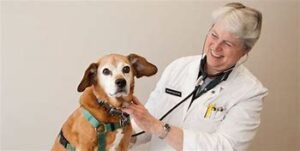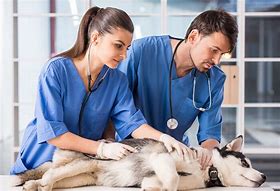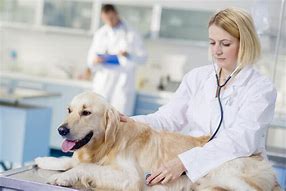Questions to ask your vet during the 1st visit with your puppy
Congratulations on your new puppy! You’re probably enjoying the playtime, snuggles, and getting to know your new pet. As a new pet owner, you’re likely wondering what you’ll need to do to keep your dog healthy and give her or him a long, healthy life. Your job as a pet parent all starts with taking him or her to the vet—and that first visit a crucial one.
Once you’ve chosen a veterinarian you’d like to work with, it’s time to schedule your first appointment. You’ll have plenty of questions to ask your new veterinarian when at this exam. Here are a few you may not have on your radar but should ask.
Your Puppy’s First Exam: What to Ask
You’ll have around 30 minutes with your vet, and you want to be sure you’re not missing anything that you’ll wonder about later. Write down a list of any questions you already have, and consider adding these.
What size will my dog grow to be?
You may be familiar with your breed to some extent, but it’s possible—especially if you’ve adopted from a shelter—that you’re not sure what size your puppy will grow to be. Your vet will be able to help you identify your puppy’s breed if you’re not entirely sure and educate you on breed-specific challenges, healthcare needs, and temperament. Your dog’s breed may determine some of their healthcare requirements, and you’ll want to know about these ahead of time.
When should I spay or neuter?
Every puppy is different, but your veterinarian will be able to give you a ballpark for spaying or neutering. You’ll want to do this before they reach sexual maturity, and your vet can give you any information you want about this procedure.
What kind of vaccinations will my puppy need?
Your vet can tell you a rundown of the vaccinations your puppy will need to stay healthy. Some of the vaccinations have the potential to save your puppy’s life, and others protect them from bothersome diseases such as influenza that dogs can pick up at parks, kennels and other places where your puppy interacts with other dogs.

What do we need to do today?
Yes, I know. This seems like an obvious one! You brought your new dog to the vet for a checkup… Duh. But different dogs need different things! Your dog’s age, breed, lifestyle, and background (whether they came from a shelter, rescue, breeder or friend) has a huge effect on what vaccines, diagnostics and preventatives (more on that below) they need. Be sure to bring any and all health records your pup came with to help your veterinary team help you. All dogs should be vaccinated for rabies and contagious viruses like distemper and parvovirus, unless there is a documented medical reason (like vaccine reactions) otherwise.
When do I come back?
Rechecks are so easy to forget, but so important! Even if your furry baby gets a clean bill of health, they may need to come back for booster vaccinations to ensure they are fully protected from contagious diseases. If any medical issues are discovered, rechecks are a must. If you have the chance, schedule your next appointment before you leave the building.

Is my puppy healthy?
Even pups who appear bright-eyed and bushy-tailed can be carrying parasites or concealing another illness beneath the surface. In your first wellness check, your vet should evaluate your puppy for any gastrointestinal, respiratory or skin issues. A fecal test can help to identify any parasites they’ve picked up in their first weeks.
How many times a day should I feed my puppy?
Most puppies need to eat more frequently than older dogs. Find out how many meals a day your vet recommends and get more bang for your buck by feeding out of interactive puzzle toys. Reserve some of your pup’s daily meals to use to reward and encourage desirable behaviors.
What type of food is best for a puppy?
Puppies typically require a different balance of nutrients than older dogs, including higher levels of protein, fat and calories. Providing proper nutrition early on can help your pup to avoid rapid weight gain, skin problems and other health issues.Talk to your vet about what brands or styles of food—kibble, dehydrated foods, canned food, raw food, home-cooked meals—they recommend for a growing pup.

Why does my dog scoot?
It’s never a welcome sight, seeing your pup drag its bottom across your pristine carpet. Common in medium to small-sized pooches, it’s mainly triggered by infected or impacted anal sacs. The sacs should empty often, alongside regular bowel movements. When they don’t, issues can arise. Other causes of scooting could be a perianal tumour, or irritation caused by matted hair, parasites or diarrhoea. Always take a scooting pooch to the vet, to safeguard against more serious medical issues.
My dog has a lump – should I be worried?
The sudden discovery of a lump on your beloved pooch can be frightening. It’s important to remember that a lump doesn’t necessarily spell trouble – in fact, many turn out to be fatty lumps, known as lipomas, which are harmless. Lipomas are benign lumps that begin life as fat cells housed in bodily tissue – they don’t tend to cause pooches any pain. They’re more frequent in middle-aged and elderly canines, and often don’t call for removal. If you find a lump on your dog, it’s always best to play it safe and consult a vet. You can never rule out more serious conditions, so your vet may extract a test sample. It’s essential to protect your pooch with quality pet insurance, as in the event of serious illness, the vet bills quickly rack up.
What preventatives should we be using?
Preventative medicine is very important in the veterinary world, and it refers to medical care that prevents the spread of disease, rather than treating a disease after it has already become a problem. The cornerstones of preventative care for dogs are vaccinations and heartworm and parasite prevention. All dogs should be heartworm tested at least once yearly, and should get heartworm prevention year-round. Most dogs will also need flea prevention, and dogs that spend a lot of time outdoors should also use tick prevention, especially in areas with dangerous tick-borne diseases. Your veterinarian can help you choose the most cost effective and convenient preventative solutions for you.
When and why should I have my pup “fixed”?
Spaying and and neutering our canine family members is an important way we can keep them safe from disease and control the unwanted pet population. If you’re not familiar, spaying is the removal of female reproductive organs (ovaries and uterus), while neutering is the removal of the testicles. The ideal time to neuter or spay most puppies is 4-6 months, while behavioral issues and risk for mammary cancers can be avoided. However, older pets can avoid issues like infection of the uterus (pyometra, see above) and prostate enlargement if they are sterilized.